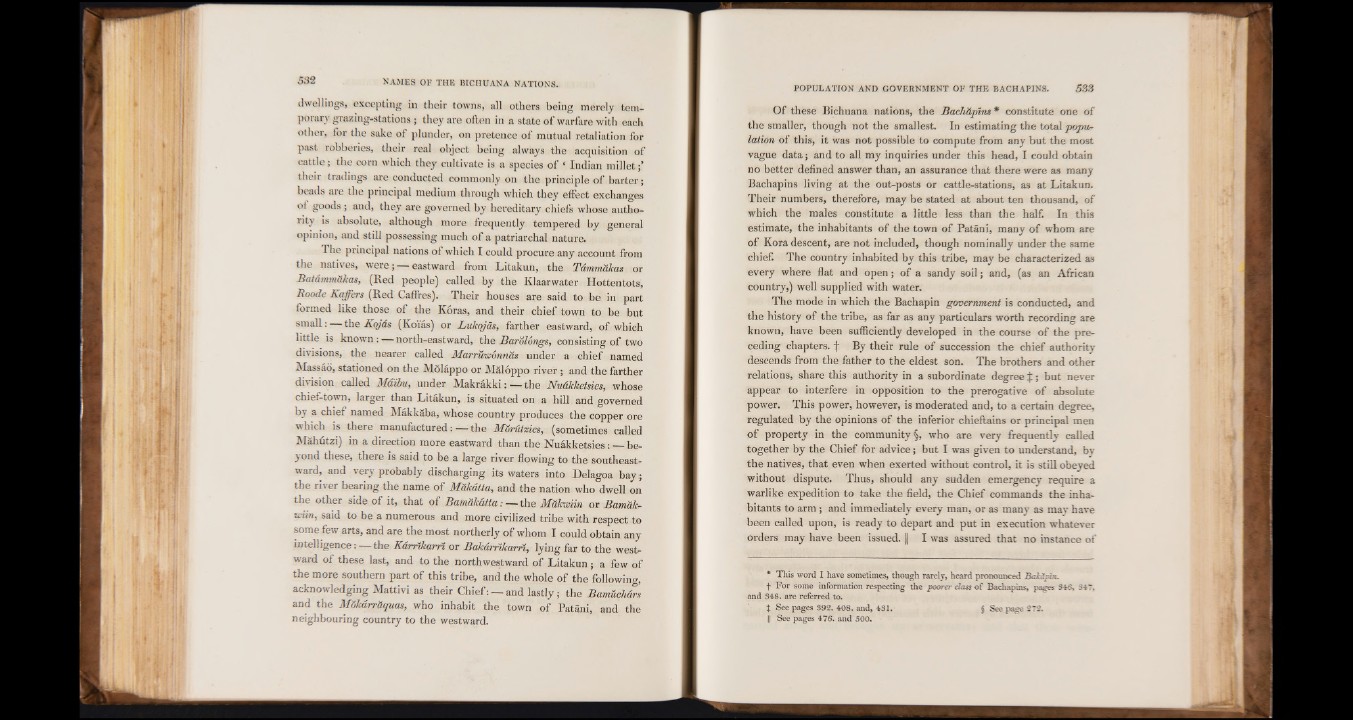
dwellings, excepting in their towns, all others being merely temporary
grazing-stations; they are often in a state of warfare with each
other, for the sake of plunder, on pretence of mutual retaliation for
past robberies, their real object being always the acquisition of
cattle; the corn which they cultivate is a species of t Indian millet;’
their tradings are conducted commonly on the principle of barter;
beads are the principal medium through which they effect exchanges
of goods; and, they are governed by hereditary chiefs whose autho-
rity is absolute, although more frequently tempered by general
opinion, and still possessing much of a patriarchal nature.
The principal nations of which I could procure any account from
the natives, were;— eastward from Litakun, the Tdmmttkas or
BatammSkas, (Red people) called by the Klaarwater Hottentots,
Roode Kaffers (Red Caffres). Their houses are said to be in part
formed like those of the Koras, and their chief town to be but
small:— the Kojds (Koias) or Lukojas, farther eastward, of which
little is known : — north-eastward, the Bardlongs, consisting of two
divisions, the nearer called Marruwonn&s under a chief named
Massao, stationed on the Molappo or M&loppo river ; and the farther
division called Afa'ibu, under Makrakki: — the Nudkketsies, whose
chief-town, larger than Litakun, is situated on a hill and governed
by a chief named Makkaba, whose country produces the copper ore
which is there manufactured:— the Mdrutzies, (sometimes called
Mahutzi) in a direction more eastward than the Nuakketsies: — beyond
these, there is said to be a large river flowing to the southeastward,
and very probably discharging its waters into Delagoa bay;
the river bearing the name of Mdkdtta, and the nation who dwell on
the other side of it, that of Bamdkatta: — the Mdkwiin or Bamdk-
teiin, said to be a numerous and more civilized tribe with respect to
some few arts, and are the most northerly of whom I could obtain any
intelligence: — the Karnkam or Bakarrlkarri, lying far to the westward
of these last, and to the northwestward of Litakun; a few of
the more southern part of this tribe, and the whole of the following,
acknowledging Mattivi as their Chief: — and lastly; the Bamuchdrs
and the Mukdrrdquas, who inhabit the town of Patani, and the
neighbouring country to the westward.
Of these Bichuana nations, the Bachdpim * constitute one of
the smaller, though not the smallest. In estimating the total population
of this, it was not possible to compute from any but the most
vague data; and to all my inquiries under this head, I could obtain
no better defined answer than, an assurance that there were as many
Bachapins living at the out-posts or cattle-stations, as at Litakun.
Their numbers, therefore, may be stated at about ten thousand, of
which the males constitute a little less than the hal£ In this
estimate, the inhabitants of the town of Patani, many of whom are
of Kora descent, are not included, though nominally under the same
chief. The country inhabited by this tribe, may be characterized as
every where flat and open; of a sandy soil; and, (as an African
country,) well supplied with water.
The mode in which the Bachapin government is conducted, and
the history of the tribe, as far as any particulars worth recording are
known, have been sufficiently developed in the course of the preceding
chapters, f By their rule of succession the chief authority
descends from the father to the eldest son. The brothers and other
relations, share this authority in a subordinate degree i ; but never
appear to interfere in opposition to the prerogative of absolute
power. This power, however, is moderated and, to a certain degree,
regulated by the opinions of the inferior chieftains or principal men
of property in the community §, who are very frequently called
together by the Chief for advice; but I was given to understand, by
the natives, that even when exerted without control, it is still obeyed
without dispute. Thus, should any sudden emergency require a
warlike expedition to take the field, the Chief commands the inhabitants
to arm ; and immediately every man, or as many as may have
been called upon, is ready to depart and put in execution whatever
orders may have been issued. || I was assured that no instance of
* This word I have sometimes, though rarely ; heard pronounced BaM psx.
t For some information respecting the poorer doss o f Bachapins, pages 346, 347.
and 848. are referred to.
t See pages 392. 408. and, 431. § See page 373.
|| See pages 476. and 500.